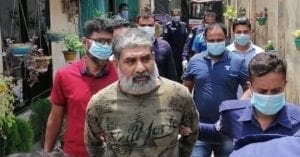
Enforced disappearances have a chilling effect on political freedom, civil society, independent media, and human rights advocacy. Victims of enforced disappearances are at heightened risk of other human rights violations, such as sexual violence, torture, and murder. In recent years, Bangladesh has seen an intensifying wave of state repression targeting independent media and journalists, civil society actors, and political activists. We urge the U.S. government to press Bangladeshi authorities for urgent action to end these intensifying attacks on human rights, provide for the safe return of any person whose whereabouts remain unknown, and deliver justice for the families of disappeared persons.
Download AIUSA’s Statement here: AIUSA Statement for the Record – Enforced Disappearances in Bangladesh
August 30th, 2021
Rep. James McGovern, Co-Chair
Rep. Christopher Smith, Co-Chair
Tom Lantos Human Rights Commission
5100 O’Neill House Office Building
200 C Street SW
Washington, D.C. 20515
Re: August 31st Briefing on Enforced Disappearance in Bangladesh
On behalf of Amnesty International and our 10 million members, activists, and supporters worldwide, we submit the following statement on enforced disappearances in Bangladesh.
Enforced disappearances have a chilling effect on political freedom, civil society, independent media, and human rights advocacy. Victims of enforced disappearances are at heightened risk of other human rights violations, such as sexual violence, torture, and killings. We welcome the Tom Lantos Human Rights Commission’s attention to this issue in honor of the Day of the Disappeared. Enforced disappearances present critical risks to human rights defenders, activists, journalists, their families, and their societies. By silencing these voices, repressive governments gravely violate human rights and cripple the protections that must be afforded all people around the world.
The International Convention on the Protection of All Persons from Enforced Disappearance, which seeks to prevent disappearances and provide survivors and victims’ families with justice and compensation, came into force in 2010. It is shameful that the United States is not a party to the Convention.
In recent years, Bangladesh has seen an intensifying wave of state repression targeting independent media and journalists, civil society actors, and political activists. The Rapid Action Battalion known as the RAB, a counterterror paramilitary unit, has carried out intimidation campaigns, enforced disappearances, and extrajudicial killings to suppress dissent.
At least 222 people were killed by Bangladeshi security forces in alleged extrajudicial executions in 2020, and at least 31 incidents of enforced disappearance were reported over the course of the year, among them a college teacher, an editor, a businessperson, two students, and four opposition activists. Three were later “found” by the police and then detained, and a student leader was released by undisclosed captors after 48 hours amid protests from civil society and human rights organizations. One political activist was found dead, and four others remained missing at the end of the year. According to Bangladeshi human rights organization Odhikar, 16 individuals have been subjected to enforced disappearance between January and June of 2021.
The country’s Digital Security Act (DSA) – a draconian law introduced in October 2018 that contains overbroad and vague provisions granting the authorities extensive powers to police online space – has been used to arrest more than 1,000 people. Cartoonist Ahmed Kabir Kishore was forcibly disappeared, tortured, and eventually imprisoned for 10 months until March this year for drawing cartoons critical of the government and other people in positions of power.
Shafiqul Islam Kajol, a photojournalist and editor of Daily Pokkhokal, was forcibly disappeared on March 10, 2020, a day after Awami League lawmaker Saifuzzaman Shikhor filed a case against Kajol under the DSA for sharing a Facebook post criticizing him. Two more cases were filed after his disappearance. Fifty-three days after he was subject to a suspected enforced disappearance, police sent him to pre-trial detention for seven months. Although he was released on bail last December, he has been charged under the DSA and could face up to seven years in prison. At a webinar on World Press Freedom Day this year, he said, “I still don’t have the courage to say whether I was forcefully disappeared or I was lost.”
Enforced disappearances are carried out to stifle dissent and consolidate the powers of repressive actors. The use of enforced disappearance cripples the rule of law, independent media, and civil society. It poses a clear threat to people throughout Bangladesh.
We urge the U.S. government to press Bangladeshi authorities for urgent action to end these intensifying attacks on human rights, provide for the safe return of any person whose whereabouts remain unknown, and deliver justice for the families of disappeared persons.
Specifically, we urge the U.S. government to:
- Raise concern at the ongoing crackdown on freedom of expression online against journalists, artists, students and activists in the form of enforced disappearances and other human rights violations;
- Hold the government of Bangladesh to account for its obligations and its commitments as a member of the Human Rights Council, including the specific voluntary pledge to “preserve freedom of the press and promote the constructive role of civil society and print, electronic and social media in the promotion of human rights at all levels,” as well as its obligation to cooperate with the Special Procedures;
- Explore ways to provide technical assistance and exchange of good practices to draft legislation or incorporate provisions within existing laws to provide an effective remedy and adequate reparations for human rights violations, including enforced disappearances.
Congress must ensure the United States does its part to stop the devastating crime of enforced disappearances in Bangladesh and around the world. We thank you for your attention to this urgent human rights issue.
Please do not hesitate to contact Carolyn Nash at [email protected] with any questions.
Sincerely,
Carolyn Nash
Asia Advocacy Director
Amnesty International USA
